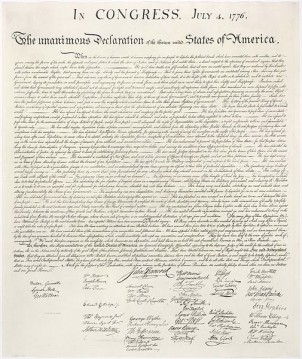(RNS) — Speaking before his newly established Religious Liberty Commission at the Museum of the Bible this week, President Donald Trump went after Virginia Sen. Tim Kaine for having “stated that the notion our rights come from our creator is, quote, ‘extremely troubling’” because it is “advocated really by a totalitarian regime.”
“But as everyone in this room understands,” Trump went on, “it is tyrants who are denying our rights and the rights that come from God. And it’s this Declaration of Independence that proclaims we’re endowed by our creator with the right to life, liberty and the pursuit of happiness. … As president, I will always defend our nation’s glorious heritage, and we will protect the Judeo-Christian principles of our founding, and we will protect them with vigor.”
It’s good to have the president, who in May called the country’s decree of divorce from England “a declaration of unity and love and respect,” show some awareness of what’s in the document. Such are the benefits of teapot tempests. So, how did this one come about?
Testifying last week before the Senate Foreign Relations Committee, Riley M. Barnes, the administration’s nominee for assistant secretary of state for the Bureau of Democracy, Human Rights and Labor, quoted this remark by his would-be boss, Secretary of State Marco Rubio: “We are a nation founded on a powerful principle, and that powerful principle is that all men are created equal, because our rights come from God our Creator — not from our laws, not from our governments.” Barnes called this America’s “core principle,” without which rights would be “mere sentiments, easily manipulated by authoritarians and bad actors.”

The Declaration of Independence. (Image courtesy of Wikimedia/Creative Commons)
Kaine responded with the following, presumably aimed as much at Rubio as at Barnes: “This notion that rights don’t come from laws and don’t come from the government but come from the Creator, that’s what the Iranian government believes. It’s a theocratic regime that bases its rule on Shi’a law, and targets Sunnis, Bahais, Jews, Christians and other religious minorities. And they do it because they believe they understand what natural rights are from their Creator. So the statement that our rights do not come from our laws or from our government is extremely troubling.”
Texas Sen. Ted Cruz then picked up the gauntlet with a misquote of Kaine’s criticism: “That ‘radical and dangerous notion’ — in his words — is literally the founding principle upon which the United States of America was created. And if you do not believe me — and you made reference to this, Mr. Barnes — then you can believe perhaps the most prominent Virginian to ever serve, Thomas Jefferson, who wrote in the Declaration of Independence, ‘we hold these truths to be self-evident, that all men are created equal, and that they are endowed by their Creator.’”
Then it was off to the races, with one conservative media outlet after another lambasting the Virginia senator for sinning against the nation’s founding document. Among those weighing in was Robert Barron, the ideologically indefatigable Catholic bishop of Winona-Rochester, Minnesota, to whom Kaine responded by insisting he agreed with Jefferson that there are certain unalienable rights but that he had “learned well during my time working with Catholic missionaries in Honduras under a military dictatorship that rights are essentially meaningless unless they are protected by law.”
To evaluate the sundry cuts and thrusts, including Trump’s, here are a few comments on what Jefferson was up to when he invoked the Deity in the Declaration.
First, Jefferson was not referring to all rights when he spoke of “certain” unalienable ones. The latter did not only include life, liberty and the pursuit of happiness. In an 1817 letter, he also refers to “the use of our faculties” and “expatriation” — the right of individuals to renounce their citizenship or nationality (in effect, a personal declaration of independence, not permitted under English common law). “We do not claim these under the charters of kings or legislators,” he writes, “but under the King of kings.”
Second, unlike alienable rights, such as the right to vote, unalienable rights are those conferred under natural law, a concept Jefferson refers to when, in the first sentence of the Declaration, he writes “the Laws of Nature and of Nature’s God” entitle a people to “separate and equal station” among “the powers of the earth.”
By “Nature’s God,” Jefferson did not mean the God of the Bible. He was particularly opposed to the exclusivism of Christianity, as represented above all in John Calvin’s idea of predestinating grace, which Jefferson considered demonic. The exclusivism of Judaism he likewise opposed. To the extent that “Judeo-Christian principles” entail any such exclusivism, Jefferson’s belief “that all men are created equal, that they are endowed by their Creator with certain unalienable rights” has nothing to do with them.
Lastly, Jefferson believed in a God that showed no partiality toward any religion, sect or individual. As he wrote in an 1819 letter, “[M]y fundamental principle would be the reverse of Calvin’s, that we are to be saved by our good works which are within our power, and not by our faith which is not within our power.”





